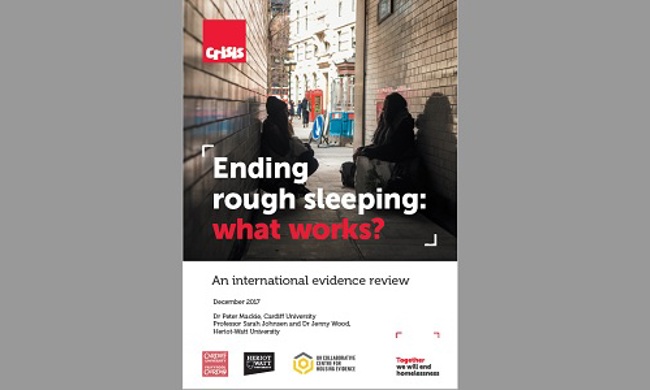Ending Rough Sleeping: What Works? An international evidence review
23.12.2017
This study demonstrates what works to end homelessness for rough sleepers through an international evidence review. The ongoing need for people to sleep rough on the streets of the UK is indicative of an unacceptable societal failure and recent homelessness projections suggest that the scale of the issue is worsening. Ending rough sleeping is an increasing policy priority across the UK. Crisis commissioned Cardiff University and Heriot-Watt University to undertake an international evidence review of what works to end rough sleeping.
Key findings:
Through analysis of over 500 published studies and interviews with eleven homelessness experts around the world, the review found that current approaches to address rough sleeping are not as effective as they might (and need) to be. The development of an improved approach to ending homelessness must of course incorporate the views of rough sleepers and those who work with them, and take into account homelessness prevention, but the learning from this evidence review can play a key role in shaping a new approach. It suggests five key principles should underpin this approach:
- Recognise heterogeneity – of individual rough sleepers’ housing and support needs and their different entitlements to publicly funded support. Local housing markets and rough sleeper population profiles will also vary across the UK.
- Take swift action – to prevent or quickly end street homelessness, through interventions such as No Second Night Out (NSNO), thereby reducing the number of rough sleepers who develop complex needs and potentially become entrenched.
- Employ assertive outreach leading to a suitable accommodation offer – by actively identifying and reaching out to rough sleepers and offering suitable accommodation.
- Be housing-led – offering swift access to settled housing including the use of Housing First
- Offer person-centred support and choice – via a client-centred approach based on cross-sector collaboration and commissioning. Personalised Budgets are a good example of this.
In the UK there is both an opportunity and a need for change in the way rough sleepers are assisted. The findings presented from this review should be used alongside the wider body of work being undertaken by Crisis with rough sleepers and those who work with them, to shape an improved approach and end rough sleeping. Moreover, we hope this synthesis will provide a reference point for policy makers, practitioners and researchers working with rough sleepers across the globe.
Reference
Mackie,P., Johnsen, S., and Wood, J. (2017) Ending rough sleeping: what works? An international evidence review. Crisis: London


